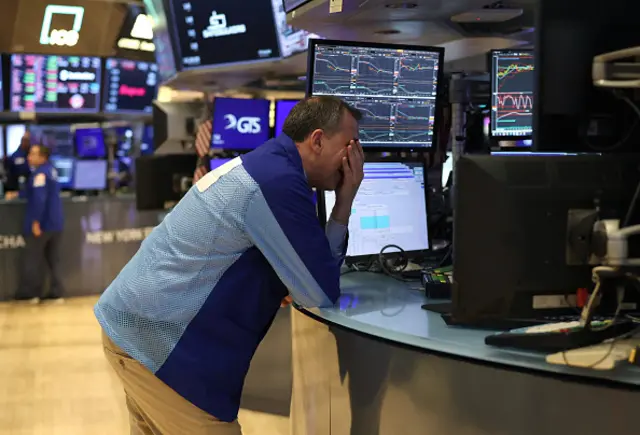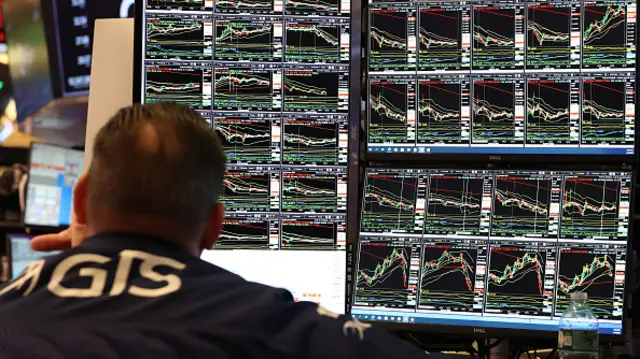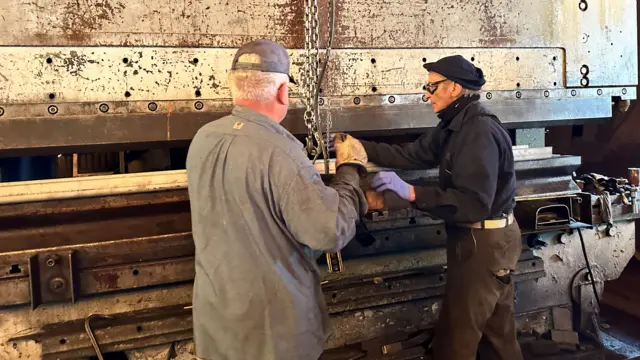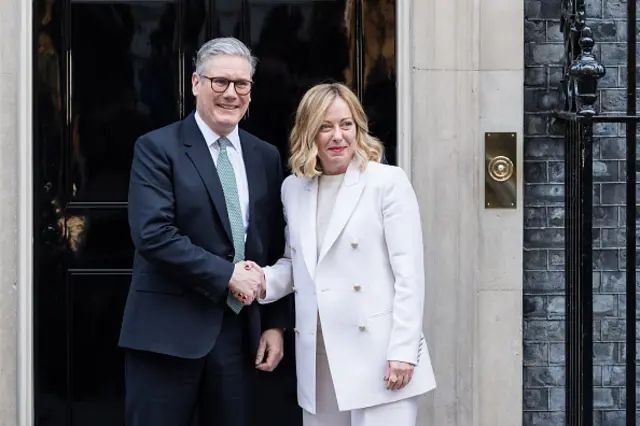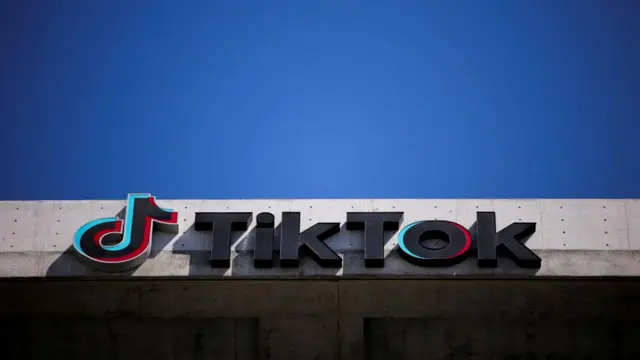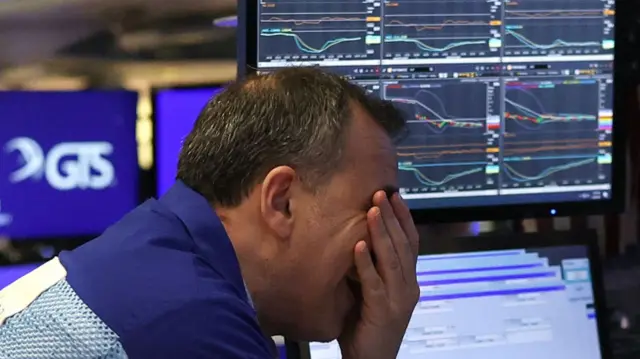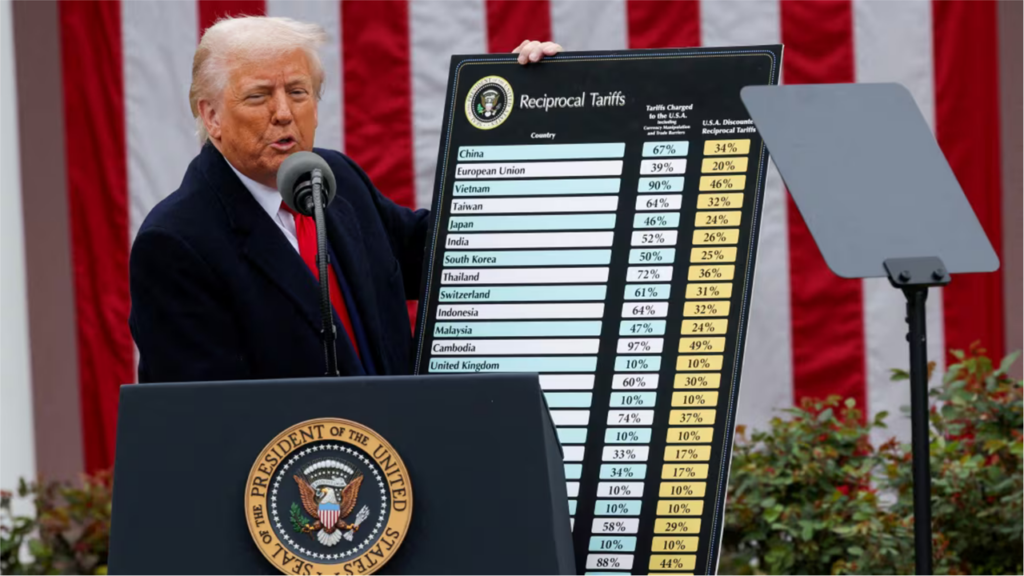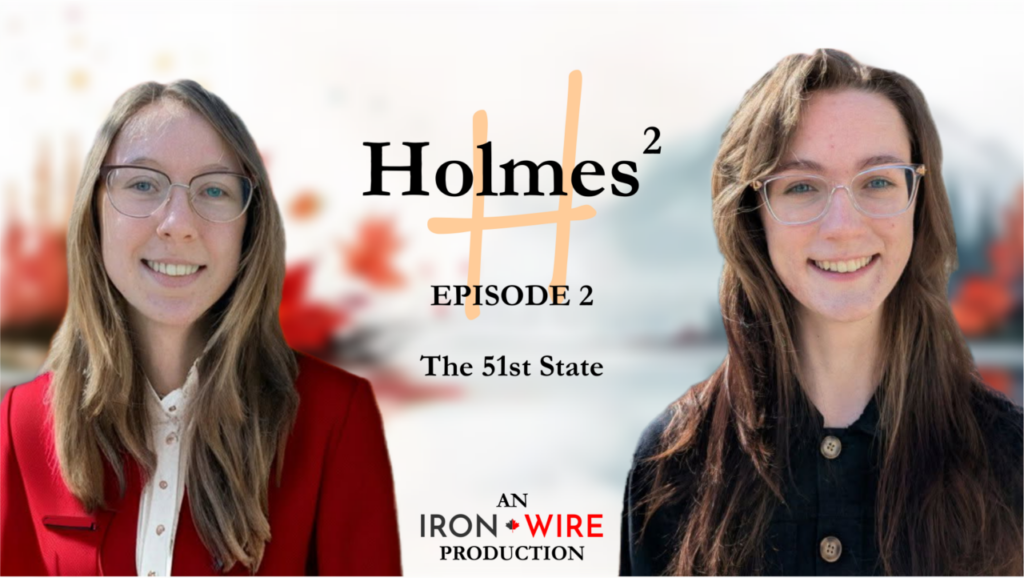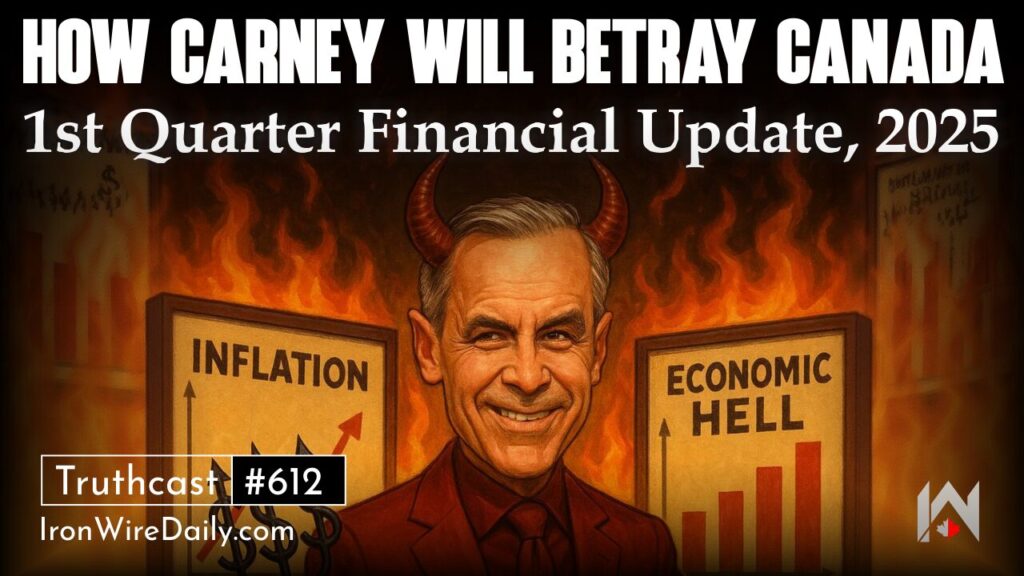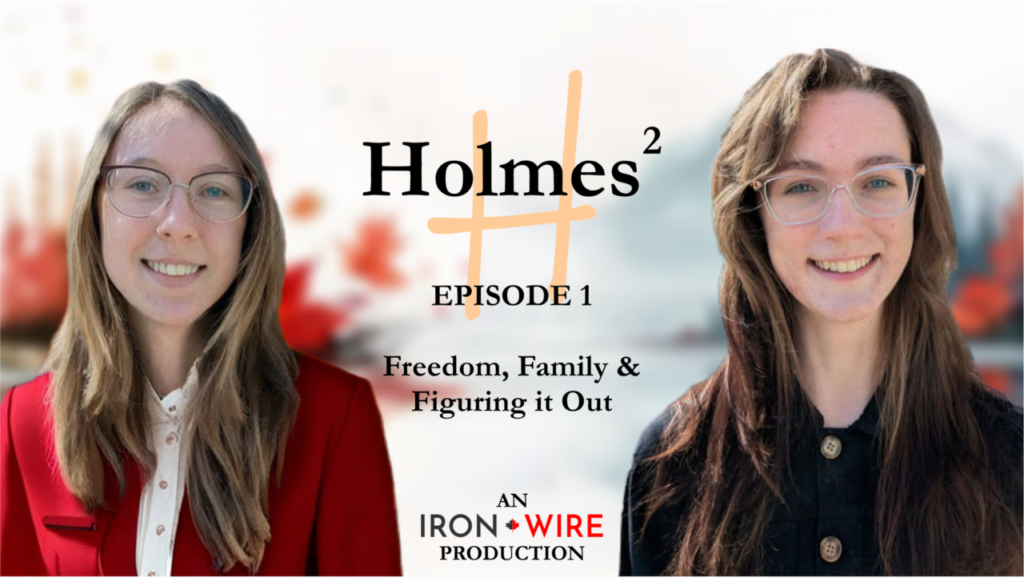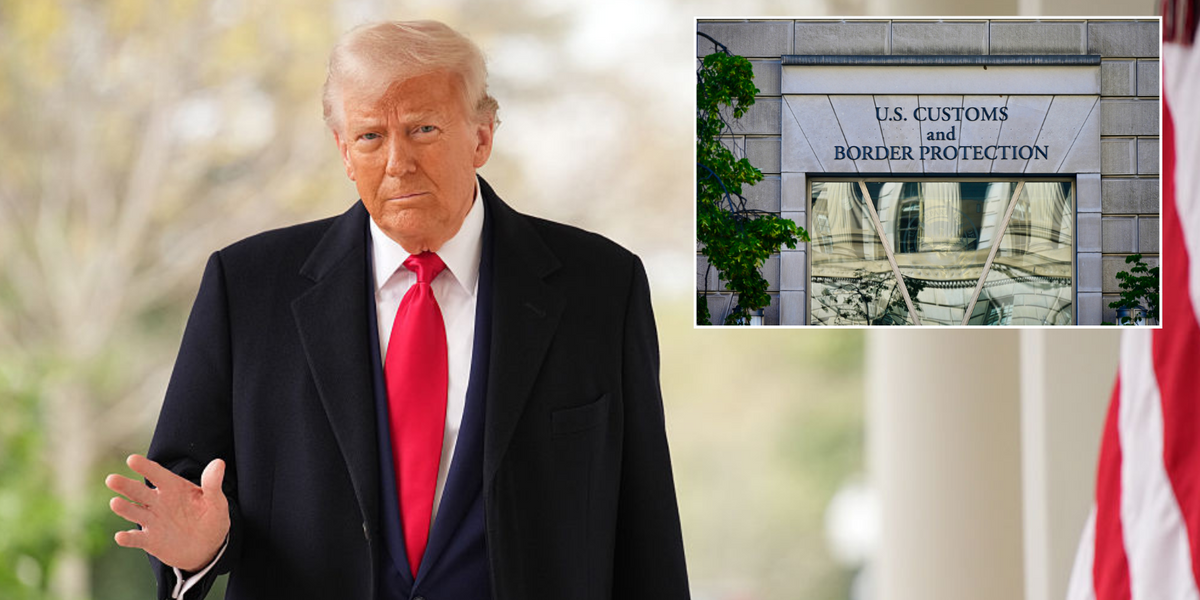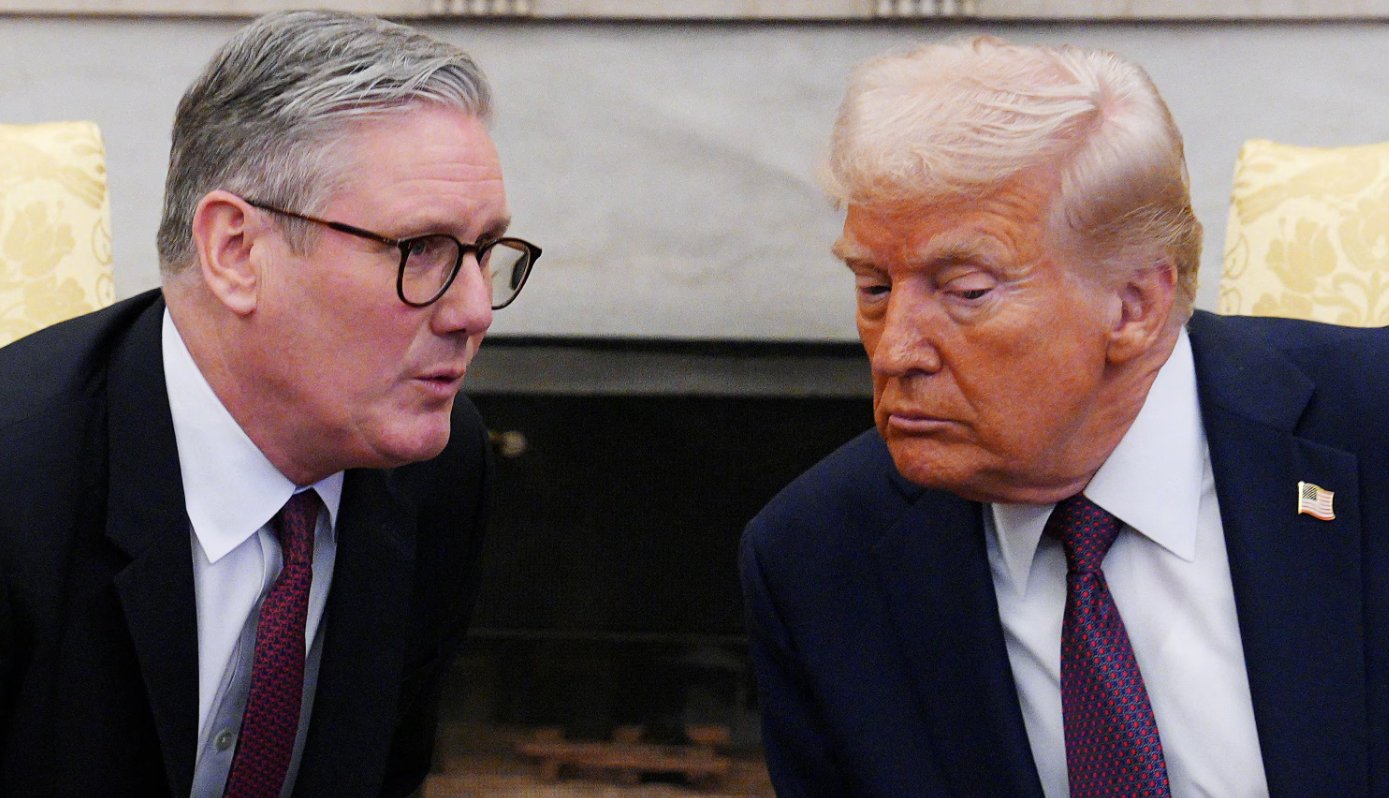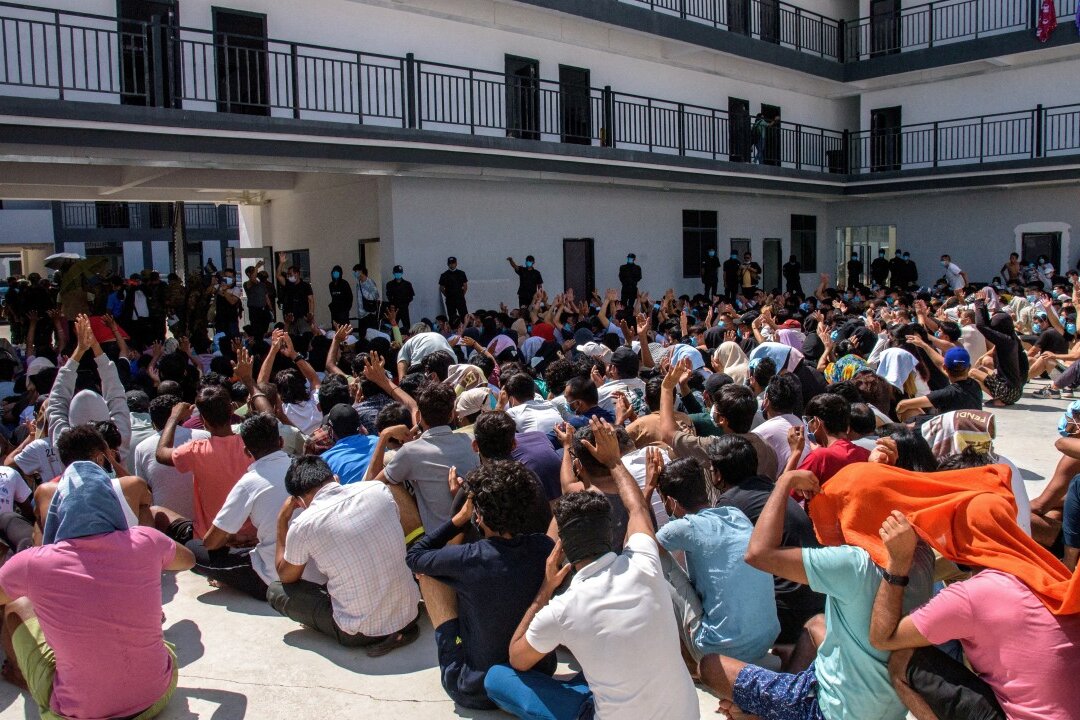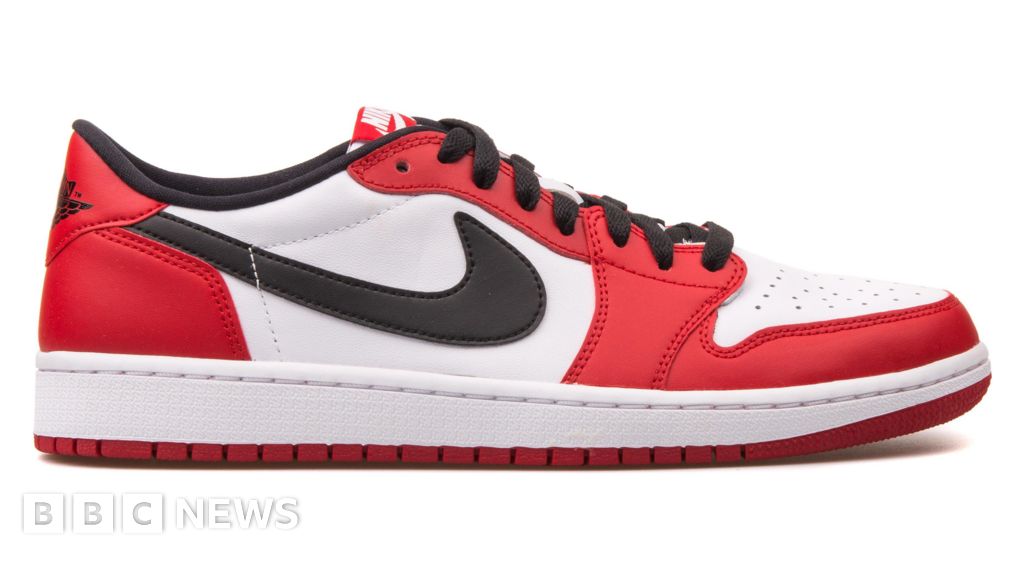Trump tariffs latest: Worst week for US stocks since Covid as 10% tariffs on UK goods kick in
Summary
-
Stock markets in the US have ended their worst week since 2020, as Donald Trump’s sweeping tariffs continue to cause turmoil on global markets
-
All three main indexes on Wall Street dropped by more than 5%,
-
Trump, meanwhile, has again insisted that taxes on goods entering the US will “supercharge” the American economy
-
Some of the tariffs have now come into force – with a “baseline” 10% charge hitting goods from the UK and many other nations
-
Need catching up on the basics? Read our summary and how falling share prices could affect you
‘No justification’ – World leaders react to Trump’s global tariffs
Live Reporting
Edited by Nathan Williams
-
Tariff turmoil as markets tumble for a second daypublished at 05:36 British Summer Time
 Thomas Mackintosh
Thomas Mackintosh
Live reporter Image source, Getty Images
Image source, Getty ImagesGlobal stocks were rocked for a second consecutive day as the worldcontinued to react to Donald Trump’s global tariffs.
Let’s round-up keymoments from Friday:
- China became the first nation to issue retaliatory tariffs on all US imports – escalating an already contentious trade war. From next Thursday US goods coming into China will be hit with a 34% levy
- We are yet to hear whether other nations will introduce retaliatorymeasures but UK PM Keir Starmer said an “all-out trade war would be extremely damaging”
- Sticking with the UK, the FTSE 100 index closed at its lowest point since the start of the Covid pandemic
- Over in New York, Wall Street traders began the day off the backof a stronger than expected US job market report – an extra 228,000 roles wereadded by employers
- But, markets tumbled when the New York Stock Exchange opened onFriday. As the bell rung to end trading, stocks slumped to a second day of declines
- The White House maintains President Trump’s high-stakes gamblewill ease out, but right now global markets are tumbling and the US dollar isfalling
-
What are Trump’s tariffs and how did he come up with the numbers?published at 05:18 British Summer Time
Donald Trump has chosen to impose a wide range of different tariffs on other countries. But how did he come up with the figures?
Ben Chu from BBC Verify explains.
-
Trump’s 10% tariffs, for UK and other countries, come into effectpublished at 05:00 British Summer Time
 Thomas Mackintosh
Thomas Mackintosh
Live reporter Image source, Getty Images
Image source, Getty ImagesGood morning from London and welcome back to our coverage as the world continues to digest President Donald Trump’s sweeping tariffs on goods imported into the United States.
On Friday, stock market turmoil deepened with all three major indexes in the US plunging more than 5%. Shares in big American companies – like Nike and Apple – which manufacture goods in highly-tariffed Asian countries dropped the most.
While China slapped a retaliatory tariff back on the US, Nintendo announced it will delay pre-orders of its new Switch 2 console over concerns about the tariffs’ impact.
And now Trump’s “baseline” 10% tariffs have come into effect for the UK and other countries. Other nations and trading partners, such as the EU, will face a higher level from the 9 April.
Stick with us as we take you through the latest.
-
Stock markets continue to fall in second day since Trump tariff announcementpublished at 22:08 British Summer Time 4 April
 Image source, Getty Images
Image source, Getty ImagesIt’s been another busy day as markets and world leaders react to Trump’s announcement of a raft of global tariffs. Here’s a recap of the latest developments:
- Stock markets in Asia, Europe and the US fell steeply in response to Trump’s tariff policy, with the US market facing its worst two-day stretch since 2020
- When the market closed in the US, the S&P 500 was down 5.98%, Dow 30 was down 5.5% and Nasdaq was down 5.82
- Earlier, China – which faces a 54% import tax – said it would introduce a 34% retaliatory tariff on US goods beginning on 10 April
- Despite the market response, Trump remained resolute and insisted his “policies will never change” before criticising China’s retaliation, saying they “played it wrong, they panicked”
- JP Morgan raised its global recession odds to 60% this afternoon – the investment bank’s previous prediction in March was 40%
- Trump also urged US Federal Reserve Chief Jerome Powell to cut interest rates. Speaking at an event, Powell said Trump’s tariffs are “significantly larger than expected” and he expects higher inflation and slower growth as a result
We’re pausing our live coverage, but you can stay across the ongoing fall-out from Trump’s tariff announcement here.
-
‘Price rises could shut down my business’, says New Jersey ownerpublished at 22:01 British Summer Time 4 April
 Nada Tawfik
Nada Tawfik
Reporting from New Jersey Image source, Nada Tawfik / BBC
Image source, Nada Tawfik / BBCAt the Jacobson Appliance in Union County, New Jersey, a shipment of refrigerators is out for delivery – which were imported before Trump’s raft of tariffs come into effect tomorrow.
Stores like this have been urging customers to makeany necessary purchases quickly before prices rise.
Owner, Pat Muscaritolo, was recently at a trade conference and says all the talk was about “tariffs,tariffs”.
They still don’t know what prices are going to be at the end of themonth, but they’re prepared for a huge increase of 30% to 40%. That couldvery well cause him to shut down his business of 40 years, he tells me as hechokes up with emotion.
It’s that outlook from businesses which has rattled Wall Streetinto thinking a recession could be on the horizon. Pat says he’s tired ofworking hard while the leaders of this country and others are “raking in moneyleft and right” on the backs of little people.
-
Trump follows through on promise to take wrecking ball to global trade orderpublished at 21:55 British Summer Time 4 April
 Anthony Zurcher
Anthony Zurcher
North America correspondent
Two days after his tariff bombshell, Donald Trump seems to have ahigh tolerance for the fallout.
Despite his talk about a third term, he isoperating like he’s got nothing to lose – and a legacy to gain.
He promisedlast year to take a wrecking ball to the establishment – government programmes,prestigious universities and, yes, the global trade order – and now he’sfollowing through.
Other Republicans, however – including those with higher politicalambitions, or seats to defend in upcoming elections – have a lot to lose.And the looming question is whether they will be willing to stick with thepresident if the political pain becomes too great.
The takeaway: Upuntil now, most Republicans have figured that the risk of crossing Trump isgreater than the potential ire of general election voters. The tariff-inducedeconomic tumult might alter that calculation.
If you’ve been enjoying live updates on this page, continue to follow the twists and turns of Trump’s second term with my US Politics Unspun newsletter.
Each week, I’ll break down what you really need to know about US politics and what it means for the rest of the world.
Readers in the UK can sign up here. Those outside the UK can sign up here.
-
Trump supporter expects tariff pains, but thinks they are neededpublished at 21:39 British Summer Time 4 April
 Nada Tawfik
Nada Tawfik
Reporting from New Jersey Image source, Nada Tawfik/BBC
Image source, Nada Tawfik/BBCImage caption, Randolph Wojcik anticipates rising prices to impact his business, but thinks Trump’s tariffs are needed
Randolph Wojcik has been working in fabrication for 50years. When I ask him whether he expects his business Doran LLC in Union, New Jersey, tobe affected by tariffs, he tells me he does expect some “short term” pain fromrising steel prices.
But the long time Trump supporter thinks tariffs areneeded. He says he’s willing to give President Trump a year or two, andnonchalantly suggests the administration can change policy and try somethingelse if it doesn’t work.
He agrees with Trump that companies will move manufacturingto the US to avoid tariffs and will hire American workers. I tell himeconomists disagree and say that won’t happen.
“Well everyone has their ownopinion. I think keep going in debt the way we are or try something different,”he replies.
-
‘Only the weak will fail’, Trump declared before US markets closedpublished at 21:36 British Summer Time 4 April
We can bring you the latest comments from Donald Trump, who took to Truth Social 25 minutes before US markets closed and declared: “ONLY THE WEAK WILL FAIL!”
As we’ve been reporting, the three main US indexes finished the day down more than 5% as markets continue to drop after Trump’s tariff announcement.
-
California asks other countries to spare US state from tariffspublished at 21:21 British Summer Time 4 April
 Christal Hayes
Christal Hayes
Los Angeles reporterCalifornia, which boasts the fifth largest global economy, is looking to build on relationships with other countries in hopes of sparing the US state from retaliatory tariffs caused by Trump’s trade war.
California Governor Gavin Newsom, a prominent Democrat, has just announced a plan that urges for exemptions of California-made products from tariffs. He says the state is home to the two biggest US ports, leads the country in manufacturing and agricultural production and has a gross domestic product of $3.9 trillion – which is 50% bigger than the next largest state of Texas.
“It’s our workers, families, and farmers who stand to lose the most from this Trump tax hike and trade war,” Newsom says.
He said his administration was working to identify opportunities with trading partners in hopes of California remaining a “steady, reliable partner for generations to come” regardless of the “turbulence coming out of Washington”.
“California is not Washington, D.C.,” he adds.
-
US markets close in worst two-day stretch since 2020published at 21:02 British Summer Time 4 April
Breaking
The bell has just rung on the New York Stock Exchange and that’s the end of trading for the day.
Trump’s tariffs have sent shockwaves through the market.
It is the worst two-day stretch in the US since 2020, when the pandemic hit.
Here’s where things stand:
- S&P 500 -5.98%
- Dow 30 -5.5%
- Nasdaq -5.82%
-
There is no good in what Trump is doing, say Kansas farmerspublished at 20:55 British Summer Time 4 April
 Cai Pigliucci
Cai Pigliucci
Reporting from KansasLouise and Vance Ehmke, farmers from western Kansas, were sitting awake at 03:00 worried for their business and its future. “There is absolutely no good whatsoever in what Trump is doing out there,” said Vance.
The two of them run Ehmke Seed, a wheat and rye seed farm. They say their cost will go up, and the prices for almost everything they sell will too.
The pair didn’t vote for Trump, but they describe themselves as conservatives. Their town and surrounding county are deep red, what’s normally described as ‘Trump country.’ Louise said she’s heard from neighbours who are worried about the impact this will have, but that are willing to give Trump the benefit of the doubt. Vance and Louise are not.
“It’s not good news for us farmers and it sure as hell is not good news for anybody who buys anything imported,” said Vance.
Vance points out that one of the key things they need to do their work is an undercutter steel blade for a plough. Those are already expensive, and Vance says one of the only places you can get quality ones is from Canada. They buy about 11 of those blades each year, and with a prolonged trade war between Canada and the US, that will only become more expensive.
“We feel like we’re going to pay the bill,” said Louise. Vance added, “Canada’s not paying that. I am paying it.”
-
Five hours after opening, US indexes drop furtherpublished at 20:24 British Summer Time 4 April
Here’s how things are looking on the US market, as of 15:10 ET (20:10 BST).
- The Nasdaq index is down 5.7%
- The Dow Jones is down 4.98%
- The S&P 500 down 5.71%.
Stick with us for further updates, and read our explainer on the three main indexes here.
-
All three US indexes drop more than 5%published at 20:04 British Summer Time 4 April
Breaking
 Natalie Sherman
Natalie Sherman
New York business reporterAll three of the big share indexes in the US are now trading down more than 5%. That’s huge, especially after the big declines we saw yesterday.
The sell-off started yesterday when firms such as Apple and Nike, which rely heavily on suppliers in Asia, were hammered. But today, the falls are moving into sectors that would typically not face direct impact of tariffs, such as healthcare and utilities.
I just got off the phone with Mike Dickson, head of research and quantitative strategies at Horizon Investments in the US.
“Candidly the mood is pretty sour and it should be,” he said, warning that it will take weeks to understand the impact of Trump’s tariffs.
He added that there were few parts of the market that had escaped unscathed. “It looks like people are just selling straight to cash. There’s a lot of uncertainty.”
-
All-out trade war would be extremely damaging, Starmer sayspublished at 19:44 British Summer Time 4 April
 Image source, Getty Images
Image source, Getty ImagesBritish Prime Minister Keir Starmer has held separate calls with his Australian and Italian counterparts today, who all agreed an “all-out trade war would be extremely damaging,” Downing Street says.
No.10 adds that the UK’s response to Trump’s tariffs will be guided by “national interest, and that we will calmly continue with our preparatory work, rather than rush to retaliate”.
-
Schumer says he will table legislation revoking tariffs that hit cost of livingpublished at 19:26 British Summer Time 4 April
We’ve just been hearing from top Senate Democrat Chuck Schumer. He says he’s introducing legislation that would rescind Trump’s tariffs.
Schumer says he wants to make an amendment to the Senate Budget Resolution which revokes any tariffs that increase the cost of groceries or medicine.
The amendment would leave in place only the tariffs on Russia, China, Iran and North Korea.
Schumer described Trump’s tariffs as “a disgrace”, and says the cost of “everything is going to go up”.
Trump, he adds, is “taxing penguins, not [Russian President Vladimir] Putin”.
Schumer is referring to the Heard and McDonald Islands, a territory mostly inhabited by penguins that faces a 10% tariff.
-
Tariffs now are ‘far from the final conclusion’published at 19:09 British Summer Time 4 April
 Natalie Sherman
Natalie Sherman
New York business reporterSimeon Siegel is managing director at BMO Capital Markets. He tracks companies such as Nike, which makes the vast majority of its shoes and clothing in countries hit hard by Trump’s tariffs.
The firm’s shares tumbled yesterday, reflecting worries about how the company will handle the sudden jump in costs due to the tariffs, which are set to go into effect on 9 April.
They are clawing back some of that ground today, buoyed by hopes that Trump’s comments on Vietnam signal willingness to negotiate a deal.
Other retailers, such as Gap, have seen similar gains.
“Most companies are looking at last night’s announcement as still far from the final conclusion,” Siegel says.
“Despite the glossy, fancy, shiny table, I don’t think that many people believe that those numbers are etched in stone just yet. Companies are still trying to figure out what this means.”
-
Trump grants TikTok extension as he hails tariffs as ‘the most powerful economic tool’published at 18:58 British Summer Time 4 April
Breaking
In his latest Truth Social post, Donald Trump says he intends to sign an executive order granting TikTok a further 75-day extension to comply with a law that requires the platform to either sell its US assets or face a ban.
Trump adds he hopes the US continues to “work in good faith with China”, but says he understands the country is “not happy about our reciprocal tariffs”.
“This proves that tariffs are the most powerful economic tool, and very important to our National Security!” Trump writes.
As a reminder, China said it would retaliate Trump’s tariffs earlier in the week with an additional 34% levy on US goods, which will come in to force next week.
 Image source, Reuters
Image source, Reuters -
Autoworkers in the US and Canada are bracing for tariff impactpublished at 18:46 British Summer Time 4 April
Trump announced new import taxes of 25% on cars and car parts entering the US from overseas, which came into effect Wednesday.
Charges on businesses importing vehicles began yesterday, and taxes on parts are set to start in May or later.
But all of the changes have made US autoworkers – and their counterparts in Canada – weary. You can hear more from them in the video below.
Media caption, Watch: US and Canadian autoworkers fear for future after Trump’s tariffs
-
How the markets are looking, four hours after the NYSE’s opening bellpublished at 18:31 British Summer Time 4 April
It’s been a whirlwind day for global markets. Here’s how things are looking as of 13:30 EST (18:30 BST).
- The S&P 500 index has fallen even further, and is now down 5.3%
- The Nasdaq is down 5.2%
- The Dow Jones is down 4.3%
Meanwhile:
- Oil prices are down 7.5% so far today
- The price of gold has sunk 2.4%
We’ll continue to monitor the markets’ response to US President Donald Trump’s tariffs. Stay with us.
 Image source, Getty Images
Image source, Getty Images -
White House insists Americans ‘already seeing results’, despite drop in global marketspublished at 18:20 British Summer Time 4 April
 Image source, Getty Images
Image source, Getty ImagesThe White House insists Americans are “already seeing the early results” of Donald Trump’s tariff move, despite US markets dropping sharply for a second consecutive day.
It says Japanese car firm Nissan has announced it will maintain two shifts at a production facility in Tennessee, before adding that General Motors announced it will boost truck production at its Indiana plant.
“In fact, President Trump has secured more private investment in his first 11 weeks than the Biden administration secured in its entire first term – and that doesn’t even include the trillions of investment from foreign governments,” the White House said in a statement.
Earlier, the US Federal Reserve chair warned that the tariffs are likely to boost inflation and slow economic growth as a global stock market sell-off deepens.
- Pausing sales, furloughing workers: Every hour companies reveal impact of tariffs, writes our economics editor Faisal Islam

